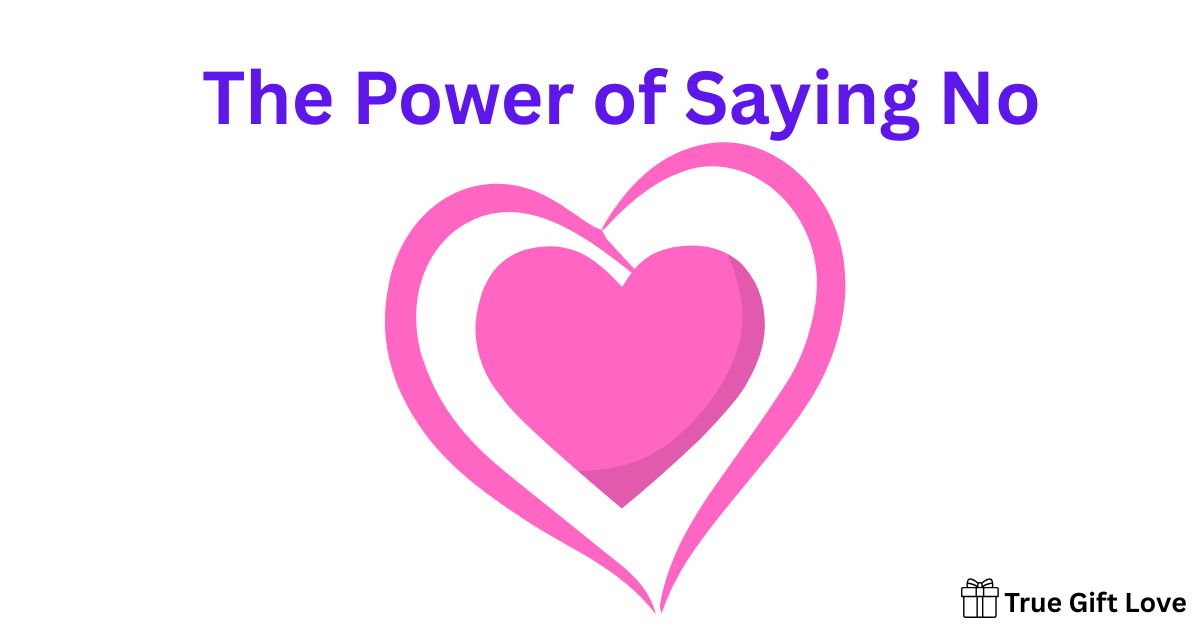No is a complete sentence. — Anne Lamott
Why So Many Women Struggle to Say No
We live in a world that often praises women for being agreeable, selfless, and accommodating. From a young age, many of us were taught that being nice means always saying yes to invitations, requests, favors, and emotional labor we never agreed to give.
So we say yes when we’re exhausted. We say yes when our intuition screams no.
We smile through discomfort, trying not to seem rude, selfish, or difficult.
But here’s the truth: every yes that betrays your peace is a “no” to yourself.
Learning the power of saying no isn’t rebellion; it’s reclamation. It’s how you reclaim your time, energy, and emotional space.
How We Were Taught to Always Say Yes
Think back to childhood.
We were praised for being “good girls” when we obeyed, when we didn’t argue, when we shared, even when we didn’t want to. “Be polite,” “Don’t disappoint,” “Make others happy,” these messages were meant to teach kindness, but often blurred into people-pleasing.
Over time, this conditioning made many of us feel guilty for setting limits.
We learned to equate no with rejection or conflict when, in truth, it’s one of the healthiest forms of communication.
As adults, unlearning this means embracing the importance of saying no because your worth isn’t measured by how much you sacrifice, but by how authentically you live.
Why Saying No Is Necessary for Emotional Health
Saying no is not about pushing people away; it’s about protecting your energy so you can show up fully where it truly matters.
Every “yes” that feels forced chips away at your emotional balance. Over time, resentment grows, burnout follows, and self-respect fades.
When you honor your boundaries, you teach others how to respect you and, more importantly, you remind yourself that your needs are valid.
The importance of saying no lies in this: it gives you space to breathe, heal, and make choices aligned with your values. It transforms guilt into clarity and fear into freedom.
Situations Where It’s Completely Okay to Say “No”
There are times when saying no is not just acceptable, it’s essential.
Here are a few examples that show the power of saying no in action:
1. How to Say No When Someone Asks You Out
If you’re not interested, you don’t owe anyone an elaborate excuse.
You can simply say, Thank you for asking, but I’m not interested.
You don’t have to smile through discomfort or say “maybe later.
Respectful honesty is far kinder than a half-hearted yes.
2. How to Say No When Someone Asks for Money
It can feel awkward, especially when emotions are involved.
But your financial boundaries matter too.
Try saying: I wish I could help, but I’m not in a position to lend money right now.
No need for guilt, protecting your stability is not selfish; it’s responsible.
3. What to Say When You Have No Hobbies? Then say, No worries.
Sometimes, people make small talk, and you feel pressured to sound interesting or busy.
If someone asks, “What are your hobbies?” and you don’t really have any at the moment, it’s okay to say, No worries, I’m still figuring that out.
There’s quiet confidence in honesty. You don’t need to perform to be accepted.
Each of these examples is a reminder that saying no gracefully or no worries calmly is an act of being fiercely kind to yourself.
When It’s Essential to Say No for Your Well-Being
You must say no when:
- You’re emotionally drained and need rest.
- Someone crosses a boundary you’ve clearly stated.
- You feel pressured to do something that doesn’t align with your values.
- Saying yes would compromise your peace, safety, or integrity.
Every “no” in these situations is an act of courage.
It’s how you protect your mental health, your goals, and your self-respect.
The power of saying no lies in choosing what truly serves you, instead of what merely pleases others.
As Suzette R. Hinton once said:
Saying no is not a rejection of others; it’s a recognition of your own worth.
The Beauty of Boundaries
Boundaries are not walls; they are gates that you control.
They don’t shut people out; they teach others how to love you better.
Healthy boundaries say:
- I love you, but I need time for myself.
- I care, but I cannot fix everything.
- I want to help, but I need to rest first.
This is where the importance of saying no shines most brightly.
It’s in those quiet, intentional decisions where you choose peace over pressure, alignment over approval.
The Power of Saying No in Everyday Life
Think of the power of saying no as emotional self-defense.
It keeps your energy sacred, your time valued, and your purpose clear.
When you learn to say no:
- You stop overcommitting.
- You stop resenting others for asking too much.
- You start feeling lighter, freer, and more grounded in who you are.
It’s not about being unkind; it’s about being honest.
And that honesty becomes the foundation of real confidence and connection.
A Gentle Reminder: Saying “No” Is Fierce Kindness
Every time you say no to what drains you, you’re saying yes to what nourishes you.
That’s not selfish, that’s self-love.
To be kind to others while being cruel to yourself isn’t kindness at all.
True compassion, what I like to call Fierce Kindness, begins when you honor your own heart first.
So take a deep breath the next time you need to decline an invitation, refuse a favor, or protect your peace. You’re not disappointing anyone, you’re simply respecting yourself.
FAQs
1. Why do many people, especially women, struggle to say no?
Many women are conditioned from childhood to please others and avoid conflict. They often feel guilty saying no, fearing rejection or being seen as selfish.
2. Why is saying no important for emotional health?
The importance of saying no lies in protecting your energy and mental peace. It helps prevent burnout, resentment, and emotional exhaustion by honoring your needs.
3. How can I say no when someone asks me out without feeling rude?
You can be honest and kind: Thank you for asking, but I’m not interested.
Learning how to say no when someone asks you out shows self-respect and clarity.
4. How do I say no when someone asks for money?
Try saying, I wish I could help, but I’m not able to lend money right now.
Setting boundaries around money is a healthy way to protect relationships and stability.
5. What should I say when I have no hobbies and someone asks about it?
You can smile and say, No worries, I’m still exploring what I enjoy.
Confidence in honesty is empowering; you don’t have to pretend to please others.
6. How does the power of saying no lead to freedom?
When you learn the power of saying no, you stop living by others’ expectations. Boundaries free your time, energy, and focus for the things that truly matter.
7. Is saying no an act of self-care?
Absolutely. Saying no is Fierce Kindness, compassion with courage. It’s self-care in action, reminding you that your well-being deserves protection.
Final Reflection
The next time you hesitate to say “no,” remember this:
You’re not rejecting someone, you’re choosing yourself.
And choosing yourself is one of the most loving things you can do.
Ask yourself: Who or what in your life do you need to say “No” to so you can finally say “Yes” to your peace?




